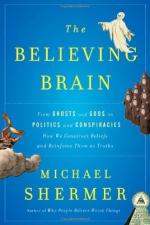|
This section contains 1,517 words (approx. 6 pages at 300 words per page) |

|
"Belief attributions" are uses of sentences of the form N believes that s (where N is a noun phrase, s a sentence). Their semantic and logical properties have been debated under the assumption that an account of "believes" will carry over to other propositional attitudes such as desire, knowledge, and fear. Most of the debate focuses on two issues: Does "believe" pick out a relation, and how do so-called de re and de dicto attributions differ?
Is "Believes" Relational?
The obvious hypothesis is that in
- Maggie believes that Twain lives.
"believes" has the semantic status of a transitive verb, picking out a relation between a believer and something (a proposition) provided by the verb's complement,
- (2) that Twain lives.
Grammatical evidence suggests this: "believes" can be followed by names and demonstratives ("I believe Church's thesis," "she believes that") as well as expressions that behave like (nominal) variables...
|
This section contains 1,517 words (approx. 6 pages at 300 words per page) |

|


